|
|
|
Sort Order |
|
|
|
Items / Page
|
|
|
|
|
|
|
| Srl | Item |
| 1 |
ID:
130331
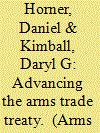

|
|
|
|
|
| Publication |
2014.
|
| Summary/Abstract |
Thomas Countryman took office as assistant secretary of state for international security and nonproliferation on September 27, 2011. He joined the U.S. Foreign Service in 1982. He was lead negotiator for the United States in the talks that produced the Arms Trade Treaty (ATT) last year. Arms Control Today spoke with Countryman in his office on March 12. Countryman was joined by William Malzahn, senior coordinator in the Office of Conventional Arms Threat Reduction. In the interview, Countryman explained the reasons that the United States signed the ATT, addressed domestic criticism of the pact, and looked ahead to the challenges that the treaty faces.
|
|
|
|
|
|
|
|
|
|
|
|
|
|
|
|
| 2 |
ID:
083840
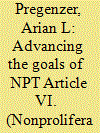

|
|
|
|
|
| Publication |
2008.
|
| Summary/Abstract |
International technical cooperation on issues relevant to the challenges of nuclear disarmament can demonstrate commitment to obligations under Article VI of the Treaty on the Non-Proliferation of Nuclear Weapons, strengthen the security of fissile materials and weapons, and develop technical approaches to support more ambitious disarmament activities in the future. Including non-nuclear weapon states would ensure that their views are taken into account and would invest them in developing solutions to key challenges. This article discusses three areas for technical cooperation that would build on past activities and that could produce such benefits as improved protection, control, and accounting of nuclear weapons and fissile material; enhanced transparency for nuclear weapon complexes; and mechanisms for international management of sensitive civilian nuclear facilities. International cooperation in each of these areas could provide a technical basis for pursuing possible future disarmament negotiations and substantively demonstrate commitment to Article VI.
|
|
|
|
|
|
|
|
|
|
|
|
|
|
|
|
| 3 |
ID:
158674
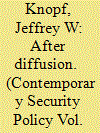

|
|
|
|
|
| Summary/Abstract |
This article discusses six challenges to enforcing norms regarding nuclear weapons. Three challenges reflect generic problems in international politics. These are differences in power, the collective action problem, and trade-offs with other interests. Three additional dilemmas reflect specific characteristics of the nuclear realm. First, membership in international treaties connected to the norms is not universal, raising questions about the appropriateness of enforcement against states that have not signed the treaties. Second, different implications of the norms can come into conflict with each other. In particular, there can be tensions between the requirements of nonproliferation and disarmament norms. Finally, some common options for norm enforcement become quite problematic when dealing with nuclear weapons. For example, if states respond to defections by starting their own nuclear weapons programs, this tit-for-tat response would defeat the purposes of the nonproliferation regime. Despite these challenges, nuclear norms enjoy widespread support and some enforcement is possible.
|
|
|
|
|
|
|
|
|
|
|
|
|
|
|
|
| 4 |
ID:
160990


|
|
|
|
|
| Summary/Abstract |
With the continued use of unsafeguarded naval nuclear-propulsion programs in all nuclear-weapon states, the commissioning of an Indian nuclear submarine, and the potential investment in such programs by non-nuclear-weapon states including Brazil and South Korea, movement toward a regulatory regime for nuclear material in the naval sector has become imperative. Such a framework faces a recurring debate on adequately protecting sensitive military technology while delivering assurances that naval nuclear material is not diverted to nuclear-weapon programs. In this viewpoint, we examine various prospective mechanisms to regulate naval nuclear stocks and assess them in terms of their effectiveness and scope. Drawing on lessons from the drafting, negotiation, and implementation of the Model Additional Protocol, we recommend a safeguards regime for naval nuclear material via a protocol that supplements the existing global nuclear-governance system. This protocol provides a standardized yet flexible approach to naval nuclear-material safeguards across all states (whether nuclear-weapon states, non-nuclear-weapon states, or outside the Treaty on the Non-Proliferation of Nuclear Weapons) to handle variations among naval nuclear fuel cycles and technologies.
|
|
|
|
|
|
|
|
|
|
|
|
|
|
|
|
| 5 |
ID:
144284
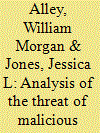

|
|
|
|
|
| Summary/Abstract |
This study seeks to evaluate the threat of malicious chemical use by non-state actors. It finds that non-state actors have primarily turned to ready-to-use crude chemical weapons (CW) instead of traditional CW agents. Interestingly, the worst crude CW attacks have been more destructive than those employing traditional CW. Scenarios for catastrophic consequences exist, but chemical attacks have typically been used to accomplish tactical goals, which leverage psychological and economic impacts. Therefore, successful efforts to counter CW proliferation by non-state actors must be substantially different from those targeting states.
|
|
|
|
|
|
|
|
|
|
|
|
|
|
|
|
| 6 |
ID:
076710
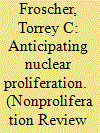

|
|
|
|
|
| Publication |
2006.
|
| Summary/Abstract |
Good intelligence is critical to support U.S. policy efforts to counter nuclear proliferation, but the historical record is mixed. This article reviews several past cases of nonproliferation success and failure, including the Soviet Union, China, India, Libya, Iraq, and the A. Q. Khan network. Intelligence frequently provides warning, and in some cases concrete and timely information has enabled nonproliferation successes. On the other hand, failures often result from a lack of detailed and specific information adequate to overturn erroneous assumptions or preconceptions. Improvements in intelligence are needed, but correct assessments of foreign programs cannot be guaranteed. A close and healthy relationship between intelligence analysts and policymakers is also a key factor in making the most of insights that are developed.
|
|
|
|
|
|
|
|
|
|
|
|
|
|
|
|
| 7 |
ID:
075781
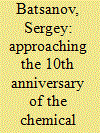

|
|
|
|
|
| Publication |
2006.
|
| Summary/Abstract |
April 29, 2007 will mark the 10th anniversary of the entry into force of the Chemical Weapons Convention (CWC), and it is also the deadline specified in the treaty for completing the destruction of all declared stockpiles of chemical weapons, most of which are owned by the United States and Russia. Unfortunately, it is already clear that neither country will meet the deadline. Although the delay in chemical weapons destruction is a serious problem, in other respects the treaty's bill of health is better than that of the Treaty on the Non-Proliferation of Nuclear Weapons or the Biological and Toxin Weapons Convention. This viewpoint reviews the current status of CWC implementation and looks forward to what might be accomplished at the Second Review Conference in April 2008.
|
|
|
|
|
|
|
|
|
|
|
|
|
|
|
|
| 8 |
ID:
074600
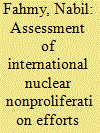

|
|
|
| 9 |
ID:
138093
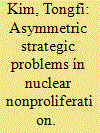

|
|
|
|
|
| Summary/Abstract |
This article explains cooperation problems between powerful democratic states and weak non-democratic states in the context of nuclear nonproliferation. Focusing on the interactions of the United States with North Korea, Iran, and Libya, it suggests that power asymmetry and information asymmetry foster mutual distrust by exacerbating two main strategic obstacles to cooperation: the time inconsistency of the stronger state’s policy and the incomplete information regarding the nondemocratic states. The nature of negotiations over nuclear weapons programs further exacerbates these problems. The overall implications of this article leave us pessimistic about the possibility of negotiated nuclear disarmament, but the theoretical analysis may help the negotiation strategy of the United States.
|
|
|
|
|
|
|
|
|
|
|
|
|
|
|
|
| 10 |
ID:
075783
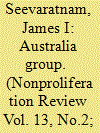

|
|
|
|
|
| Publication |
2006.
|
| Summary/Abstract |
The Australia Group's (AG's) contributions toward stemming global proliferation of chemical and biological weapons of mass destruction over the last 20 years are noted, in addition to the group's complementary role in effectively supporting the purpose and objectives of the Chemical Weapons Convention (CWC). This report also outlines the organizational and operational means that help accomplish the AG mission and notes the U.S. Congress' recognition of the role of the AG in countering chemical and biological weapons proliferation. Addressing criticism by some CWC states parties that question the AG's role in nonproliferation, the author also highlights the AG's expanded reach since September 2001 over terrorist activity. Finally,the article identifies a challenge the AG now faces in furthering its objectives and offers a possible solution.
|
|
|
|
|
|
|
|
|
|
|
|
|
|
|
|
| 11 |
ID:
013119
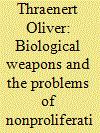

|
|
|
|
|
| Publication |
1997.
|
| Description |
148-57
|
|
|
|
|
|
|
|
|
|
|
|
|
|
|
|
| 12 |
ID:
142653
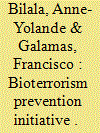

|
|
|
|
|
| Summary/Abstract |
The threat of terrorist use of weapons of mass destruction remains a daunting concern. Governments have undertaken several initiatives at the national and international level to prevent such illicit use, yet challenges remain. Notable is the absence of a single collaborative international forum of experts dedicated solely to bioterrorism prevention. The establishment of a Bioterrorism Prevention Initiative could be a possible solution to address this gap. This article explores possibilities for such an initiative and the ways in which it could strengthen the existing bio-nonproliferation regime.
|
|
|
|
|
|
|
|
|
|
|
|
|
|
|
|
| 13 |
ID:
166861
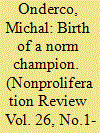

|
|
|
|
|
| Summary/Abstract |
In 1995, South Africa was in a special position. It was: a new party to the Treaty on the Non-Proliferation of Nuclear Weapons (NPT), the first country to voluntarily renounce nuclear weapons, led by a charismatic leader, and seen as a champion of disarmament principles. Yet South Africa’s new leaders were also interested in affirming their position within the Non-Aligned Movement, which was adamantly opposed to the NPT’s indefinite extension. Why, then, did South Africa decide to support the indefinite extension of the NPT in 1995? Existing scholarship has ascribed too much credit to pressure from the United States, overlooking domestic debates in South Africa and the bifurcation between professional diplomats and political elites. This article, building on new archival sources and in-depth oral-history interviews with major actors, demonstrates that South African diplomats opposed indefinite extension while South African policy elites allocated little attention to the topic until late in the game. The findings contribute to our understanding of South Africa’s norm entrepreneurship, as well as the politics of global nonproliferation.
|
|
|
|
|
|
|
|
|
|
|
|
|
|
|
|
| 14 |
ID:
118375


|
|
|
|
|
| Publication |
2013.
|
| Summary/Abstract |
Latin American countries have historically followed different paths and logics toward the nonproliferation regime. Some states have unconditionally advocated for global and nonproliferation efforts, while others have vehemently opposed such measures or remained ambivalent toward the regime itself. By historically comparing two of Latin America's most influential countries-Brazil and Mexico-this study identifies the underlying domestic conditions and external influences that explain their differences in behavior and policy toward the nonproliferation regime. Because little is known about the reasons why different Latin American countries adopt these different approaches, the purpose of this article is to resolve this problem, primarily by focusing on the ways in which evolving civil-military relations and US influence have shaped nonproliferation policy preferences in Latin America. It concludes with a discussion of how these historical cases might shed light on current nonproliferation policies in Latin America.
|
|
|
|
|
|
|
|
|
|
|
|
|
|
|
|
| 15 |
ID:
005802
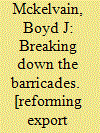

|
|
|
|
|
| Publication |
Washington DC, CSIS, 1994.
|
| Description |
82p.
|
| Standard Number |
0892062614
|
|
|
|
|
|
|
|
|
|
|
|
Copies: C:1/I:0,R:0,Q:0
Circulation
| Accession# | Call# | Current Location | Status | Policy | Location |
| 036121 | 382.640973/MCK 036121 | Main | On Shelf | General | |
|
|
|
|
| 16 |
ID:
006855
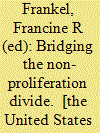

|
|
|
|
|
| Publication |
New Delhi, Konark Publishers, 1995.
|
| Description |
xx, 410p.
|
| Standard Number |
8122004156
|
|
|
|
|
|
|
|
|
|
|
|
Copies: C:2/I:0,R:0,Q:0
Circulation
| Accession# | Call# | Current Location | Status | Policy | Location |
| 037150 | 355.825119/FRA 037150 | Main | On Shelf | General | |
| D37150 | 355.825119/FRA D37150 | Main | On Shelf | General | |
|
|
|
|
| 17 |
ID:
162686
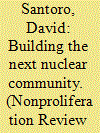

|
|
|
|
|
| Summary/Abstract |
This viewpoint takes stock of the changes in the strategic nuclear landscape in recent decades and reflects on its consequences on the policy community. It finds that the number and scope of issues have expanded considerably; they have manifested themselves in many more regions of the world; and they have become deeply politicized and polarized. The consequences have been twofold: the nuclear policy field has seen the development of an increasingly diverse expert community composed of highly specialized functionalists and regionalists, and it has become ever more divided into two entirely separate ideological camps—one that believes in deterrence, the other in disarmament. The stove-piping of expertise and the widening gap between deterrence and disarmament ideologies are immensely problematic because, in different ways, they stand in the way of the emergence of a better and safer nuclear future. Looking ahead, it is critical to “bust the silos of expertise” and to build bridges between the deterrence and disarmament ideological camps. Only such a community-building effort will help solve today’s and tomorrow’s nuclear challenges.
|
|
|
|
|
|
|
|
|
|
|
|
|
|
|
|
| 18 |
ID:
023553
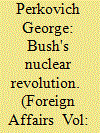

|
|
|
|
|
| Publication |
March-April 2003.
|
| Description |
2-8
|
|
|
|
|
|
|
|
|
|
|
|
|
|
|
|
| 19 |
ID:
053017
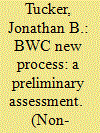

|
|
|
| 20 |
ID:
082175
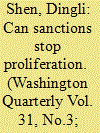

|
|
|
|
|
| Publication |
2008.
|
| Summary/Abstract |
How effective have sanctions been, and what do the North Korea and Iran cases say about China's evolving attitudes toward sanctions as a nonproliferation tool
|
|
|
|
|
|
|
|
|
|
|
|
|
|
|
|
|
|
|
|
|